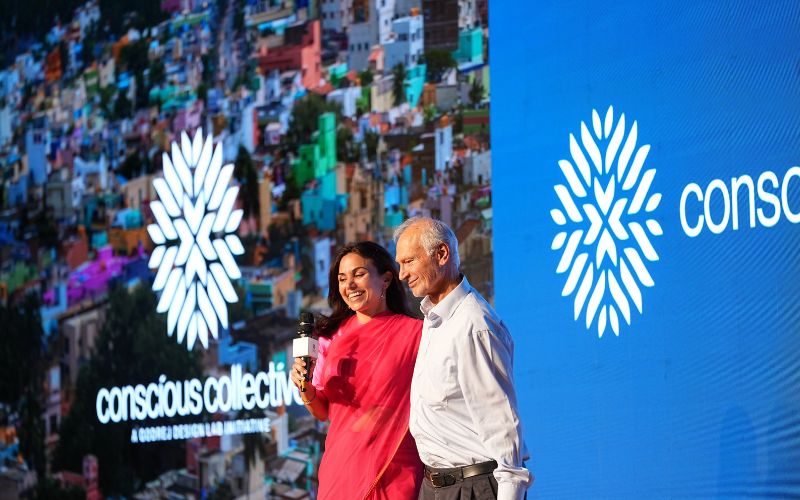“The report offers a comprehensive framework for convergence across the built environment, providing tailored recommendations for stakeholders. By prioritizing behavioural change, fostering collaboration, and driving innovation, it equips policymakers, industry leaders, and consumers with the tools to enable large-scale adoption and realize a sustainable, net-zero future.” Nyrika Holkar, Executive Director, Godrej Enterprises Group
“Decarbonizing India’s built environment hinges on collaboration among policymakers, businesses, and consumers to align on cost-efficient solutions, skills development, and individual action. As time runs out, the emphasis must shift from isolated pilot successes to models that deliver impact at scale.” Dr Arunabha Ghosh, Founder-CEO, CEEW
Godrej Design Lab, part of the Godrej Enterprises Group, in collaboration with the Council on Energy, Environment and Water (CEEW) and Integrative Design Solutions (IDS), has unveiled the ‘Building a Climate-Conscious India: Scalable Solutions for a Low-Carbon Built Environment’ report at Conscious Collective 2024. The report provides a comprehensive roadmap to decarbonize India’s building sector, a critical contributor to global greenhouse gas emissions, and serves as a guide for architects, designers, developers, and policymakers to scale proven solutions.
Speaking about the trends report, Nyrika Holkar, Executive Director, Godrej Enterprises Group, said, “The built environment and cities are pivotal to India’s net-zero ambitions. With 40% of India’s buildings yet to be constructed over the next 20 years, decisive action by the building sector today can set the nation firmly on a net-zero trajectory. The report offers a comprehensive framework for convergence across the built environment, providing tailored recommendations for stakeholders. By prioritizing behavioural change, fostering collaboration, and driving innovation, it equips policymakers, industry leaders, and consumers with the tools to enable large-scale adoption and realize a sustainable, net-zero future.”
The built environment accounts for 37% of global greenhouse gas emissions, with cities contributing 70%. The report projects that strategic interventions could enable an 81% reduction in carbon emissions from India’s building sector by 2050. It emphasizes the need for scalable solutions across four critical areas: urban planning, material and design innovation, building-level energy efficiency, and consumer-driven initiatives.
Dr Arunabha Ghosh, Founder-CEO of CEEW, stated, “Decarbonizing India’s built environment hinges on collaboration among policymakers, businesses, and consumers to align on cost-efficient solutions, skills development, and individual action. As time runs out, the emphasis must shift from isolated pilot successes to models that deliver impact at scale. Achieving this requires the right mix of cost-efficiency, skills development, and alignment with consumer preferences. Encouragingly, the market is showing readiness to embrace low-carbon interventions. The next step is to empower key actors and unlock the levers that will transform this opportunity into a win for both business and the climate.”
The report offers actionable steps, including implementing performance-based green building codes, streamlining compliance, and adopting innovative tools like gamification and blockchain-based energy trading. With successful case studies like Telangana’s Cool Roof Programme, Krushi Bhawan in Odisha, and blockchain-enabled Power Ledger projects are highlighted in the report alongside global best practices, such as Medellin’s Green Corridors, which reduced local temperatures by 2°C. These examples demonstrate the potential for widespread impact through innovative strategies.
Aligned with Godrej Enterprises Group’s commitment to creating a Good and Green India, the report reinforces the company’s dedication to empowering consumers, reducing emissions, and conserving biodiversity for a sustainable future.
About CEEW: The Council on Energy, Environment and Water (CEEW) — a homegrown institution with headquarters in New Delhi — is among the world’s leading climate think tanks. The Council is also often ranked among the world’s best-managed and independent think tanks. It uses data, integrated analysis, and strategic outreach to explain — and change — the use, reuse, and misuse of resources. It prides itself on the independence of its high-quality research and strives to impact sustainable development at scale in India and the Global South. In over fourteen years of operation, CEEW has impacted over 400 million lives and engaged with over 20 state governments.

